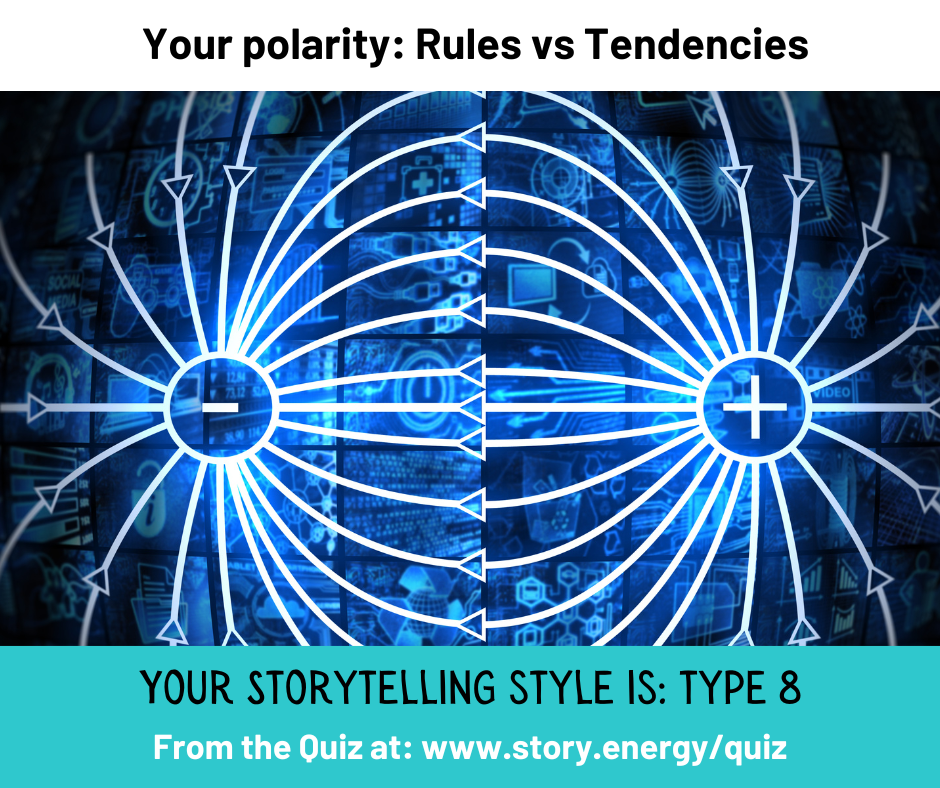Storytelling Style 8

Enneatype 8 is called The Protector, or The Challenger
The personal evolution of the Protector is propelled through a tension created by their fixation: the need for control and power and fear of being vulnerable or weak, which reflects the polarity of rules versus tendencies. By embracing this tension as a tool for storytelling, the Protector creates stories that honor both sides of this polarity. Through the act of storytelling, they explore the nuances of their own psyche, moving closer to their personal truth and achieving a level of personal growth that is both transformative and cathartic.
When Storyweaving, your work channels the spirit of:
WILL and the Domain of CULTURE AND BEHAVIOR
Your Storytelling Style is the orientation of your Ego Fixation, AKA your enneagram type.
Once upon a time, there was an author whose fixation on control and power had led them to a constant search for the balance between rules and tendencies. They were driven by the need to create stories that honored their own unique perspective, yet were plagued by the fear of vulnerability or weakness.
As a Storytelling Style 8, the Protector used this tension as a tool for storytelling. They created stories that honored both sides of the rules-versus-tendencies polarity. Through the act of storytelling, they explored the nuances of their own psyche.
Inspired by other famous thinkers and writers, such as Ernest Hemingway and Joan Jett, the Protector saw their own fixation as a path to personal growth and transformation. Through their stories, they explored the complexities of the human experience and the hidden depths of the soul.
Through the act of storytelling, the Protector achieved a sense of empowerment and understanding. They learned to embrace both the need for control and the importance of vulnerability, finding strength and significance in even the most difficult of moments.
As the Protector continued to write, they found that their own personal evolution was propelled forward by their fixation. They learned to balance the desire for power and control with the need for authenticity and vulnerability. By sharing their own struggles and triumphs through their writing, they were able to connect more deeply with readers and create stories that were both impactful and inspiring.
The truth your stories help us remember:
“The awareness that the cosmos objectively exists now; that this existence is its own definition, and continues whether an individual understands it or not; and that the individual experiences of truth of Reality most completely when he views each moment fresh, without preconceptions about what should be happening.” Ichazo, 1972
Your storytelling shadow may sound like:
“People are naive idiots and when you turn your back they’ll take advantage of you. I’ll be damned if anyone gets one over on me.”
See, your Storytelling Style is what it is, because The Art of Transformational Storytelling is YOUR vehicle for transforming YOURSELF, with a side effect of transforming your audience.
We have made a powerful in depth course on this topic exactly:
More details about type 8:
Type 8 Distorted Instincts
Fixation: Vengeance
Passion: Lust
Type 8 Undistorted Instincts
Holy Idea: Holy Truth
Virtue: Innocence
Type 8 Emotional Polarities:
Innocence vs Lust
Type 8 Obsessive Polarities:
Strong vs Weak
What causes me stress:
Being unable to correct perceived injustice. Having to contain my confrontational style and having difficulty containing it. Going full-out and denying fatigue or pain.
The nature of my anger:
Powerful anger expressed in direct, confrontational style or armored withdrawal. Balancing the books (Revenge).
The ultimate goal of my development:
To realize that we are all inherently innocent and can naturally sense truth; that approaching each situation with a fresh perspective and free of personal prejudice enables us to recognize truth.
How I can further my development:
Notice my intensity and the impact it has on others. Treat what seems like weakness as progress in letting myself experience vulnerability and tender feelings. Practice waiting and listening before taking action as a way to moderate my impulsivity. Seek win-win solutions. Use only appropriate force in any situation.
What hinders my personal development:
Refusing to be controlled and being unaware of controlling others. Excessive lifestyle that leads to exhaustion and alienation of others. Self-defeating behaviors. Denial of my fears, weaknesses, and vulnerability. Not valuing my own tenderness and sensitivity.
How others can support my development:
Stand their ground. Stay firm. Be forthright. Speak their own truth. Provide feedback about my impact on them. Support me when I reveal softer feelings and vulnerabilities.
